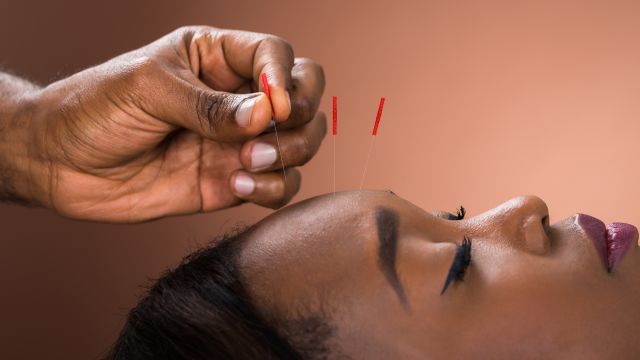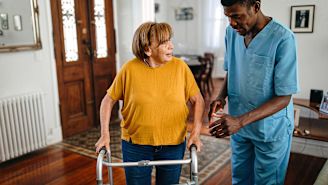Can a millennia-old practice really help your health? Proponents of acupuncture think so, and science backs them up. “My patients are often surprised about the breadth of research, and that acupuncture is taught in many medical schools,” says Sheri Krauss, a licensed acupuncturist with Our Lady of Lourdes Medical Center in Cherry Hill, New Jersey. “They’re surprised it’s as scientific as we believe it to be.”
How acupuncture works
According to Krauss, acupuncture falls under the umbrella of Traditional Chinese Medicine (TCM). TCM focuses on energy blockages, and practitioners believe that acupuncture can get rid of those blockages and bring someone back to health. But there are theories to how acupuncture works that touch upon modern medical understanding as well.
One possibility, according to Krauss, is that “Acupuncture points can help stimulate the central nervous system, which will release chemicals in the muscles, spine and brain. These chemicals can affect the experience of pain.” Exactly how acupuncture works still isn’t fully understood, and it’s possible that the overall experience of acupuncture—as opposed to the actual insertion of needles—can explain some of the benefits.
What to expect
First your acupuncturist will take your medical history and may give you a physical examination to help determine what treatment you need. “Acupuncture has its own way to diagnose. It’s a little different from Western medicine but it’s very thorough,” says Krauss. “I do it with all patients regardless of whether they come in with a Western diagnosis. It offers another perspective.”
Next, the acupuncturist will have you lie down and begin to insert thin, sterile needles in particular points. You may feel the needles prick the skin, but it is not typically painful. Once the acupuncturist has finished, expect to be lying down and relaxing with the needles in place for 5 to 30 minutes.
You may not feel any change in your condition after your first session, but you and your acupuncturist will work together to come up with a treatment plan. Acute pain can take 8 to 10 sessions to complete treatment, and your acupuncturist will probably want to see you at regular intervals for maintenance.
What acupuncture can—and can’t—treat
Krauss says that most of the scientific studies about acupuncture center around using acupuncture to treat pain. A 2012 meta-analysis of 29 studies including nearly 18,000 people, published in JAMA Internal Medicine, found that acupuncture proved more effective than a placebo to control back and neck pain, osteoarthritis and chronic headaches. Acupuncture has also been shown in clinical studies to help reduce pain and fatigue from cancer and nausea from cancer treatments.
“Acupuncture is good at treating pain, and especially good with conditions related to stress,” says Krauss. “It treats pain, muscle tension and stress-related gastrointestinal problems really well.” A January 2017 study published in National Institute for Health Research Journals Library suggests that acupuncture can enhance the effectiveness of standard treatment in chronic pain and depression cases.
Acupuncture is not a panacea or cure-all, however. The practice is often sought out to help people quit smoking, but a 2014 meta-analysis of 38 studies suggests that acupuncture and other related techniques and procedures are not effective in the long run in helping people to quit smoking. Systematic reviews of the research on using acupuncture to treat anxiety and depression have also been mostly inconclusive.
Talk to your healthcare provider
Ask your healthcare provider if acupuncture is right for you and your condition. The medical community is generally receptive to acupuncture, Krauss says. “By and large the medical community is pretty supportive,” she says. “A lot of the people I work with know doctors who do acupuncture. The training and approach might be different but they like being able to have alternatives.”






